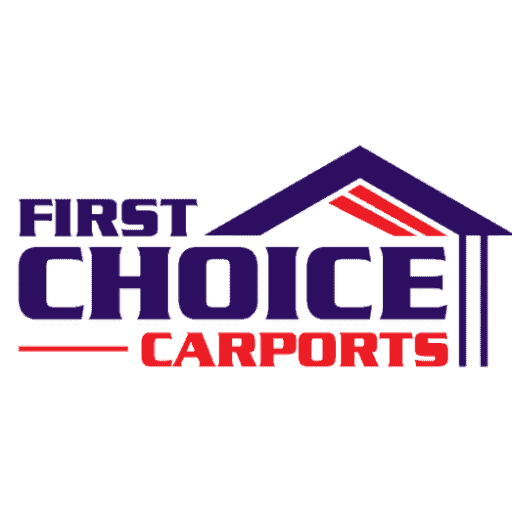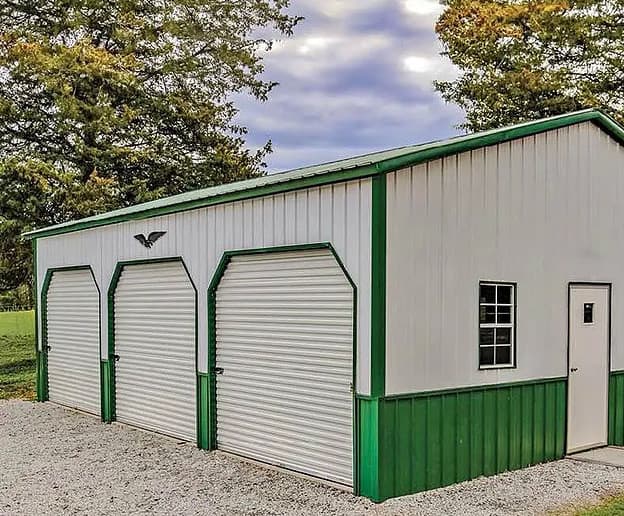If you are considering purchasing a metal carport for agricultural use, there are several important factors to consider to ensure that the structure is well-suited to your specific needs. From the size and dimensions of the carport to its anchoring options and ventilation, buyers should ask the right questions to make informed decisions. Additionally, buyers should consider the various customization options available, such as enclosures, insulation, electrical wiring, and lighting, to create a functional and comfortable environment for their agricultural activities.
Carports are typically used to provide shelter for vehicles, but they can also serve other purposes. One potential use for a carport like Building #79 from First Choice Carports is as a covered storage area for agricultural equipment and supplies. This could include tractors, plows, fertilizers, pesticides, and other tools and materials that are used in farming operations. By providing a covered space, a carport can protect these items from the elements and extend their lifespan. Let’s take a closer look.
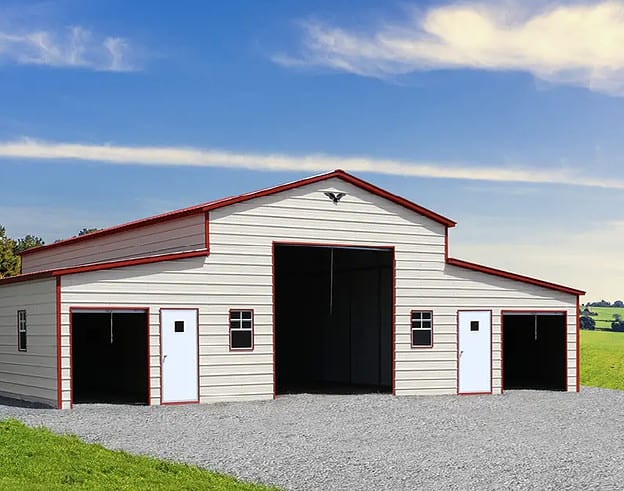
Another possible agricultural use for a carport is as a shelter for livestock. Depending on the size and design of the carport, it could potentially house animals such as pigs, goats, or sheep. However, it is important to note that proper ventilation, drainage, and sanitation are essential for creating a healthy living environment for animals. It is also important to ensure that the carport is securely anchored and structurally sound, as animals can be heavy and may cause damage if they are not properly contained.
In addition to storage and shelter, carports can also be used for agricultural processing and production. For example, a carport could be outfitted with tables and equipment for washing, sorting, and packaging produce. It could also be used as a temporary processing facility for livestock or poultry, such as during butchering or processing for sale. Again, it is important to ensure that the carport is clean, sanitary, and well-ventilated for these types of activities.
Further, carports can be used as a greenhouse or other type of plant-growing facility. Depending on the design and materials used, a carport could potentially be converted into a climate-controlled environment for growing vegetables, herbs, or other plants. This could be done using hydroponic or other advanced growing methods, or simply by using traditional soil-based methods. By providing a covered and enclosed space, a carport can protect plants from weather and pests, and create a more controlled growing environment.
Of course, the specific uses for a carport like Building #79 will depend on a number of factors, including the size, location, and intended use of the building. It is important to carefully consider the needs of the farming operation and to work with a knowledgeable contractor to design a carport that meets those needs. With the right planning and design, a carport can provide a versatile and valuable addition to any agricultural operation.
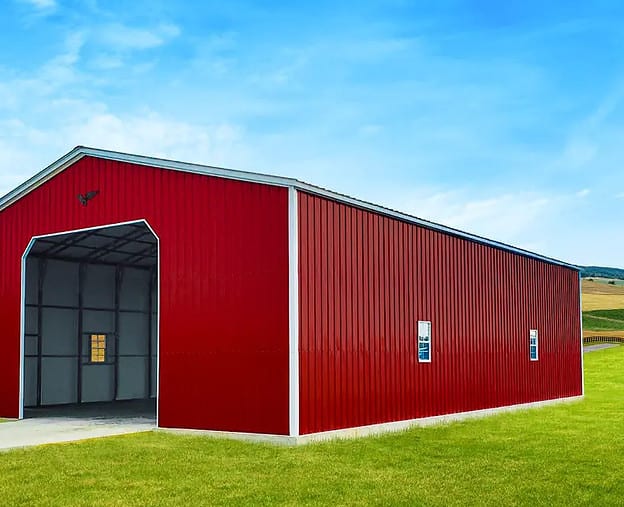
Yet, if a buyer is considering purchasing a carport for agricultural use, there are several important questions they should ask in order to ensure that the carport is well-suited to their needs. Here are some key questions to consider:
- What are the size and dimensions of the carport? The size of the carport will determine how much equipment, supplies, or animals can be housed within it. Buyers should ensure that the carport is large enough to accommodate their needs.
- What materials is the carport made of? The materials used in the construction of the carport will affect its durability and ability to withstand harsh weather conditions. Buyers should look for carports made of high-quality materials such as steel, aluminum, or another variant of metal.
- Is the carport designed to be anchored to the ground? This is particularly important for agricultural uses, as animals or heavy equipment can cause the carport to shift or tip over if it is not properly anchored.
- Does the carport have proper ventilation? Depending on the intended use of the carport, proper ventilation may be necessary to ensure a healthy environment for animals or plants. Buyers should ensure that the carport has adequate ventilation, such as vents or windows.
- Is the carport structurally sound? The carport should be designed and constructed to withstand the weight of equipment or animals and the forces of wind and weather. Buyers should ask about the load-bearing capacity of the carport and any reinforcements or additional support that may be necessary.
- Can the carport be customized to meet specific needs? Depending on the intended use of the carport, buyers may need to customize the structure with additional features such as insulation, heating or cooling systems, or specialized lighting. Buyers should inquire about the availability of these features and the cost of customization.
- What is the warranty on the carport? A warranty can provide assurance that the carport is a quality product and can protect the buyer from defects or damage. Buyers should ask about the length and coverage of the warranty.
By asking these and other relevant questions, buyers can make informed decisions about the suitability of a carport for their agricultural needs.
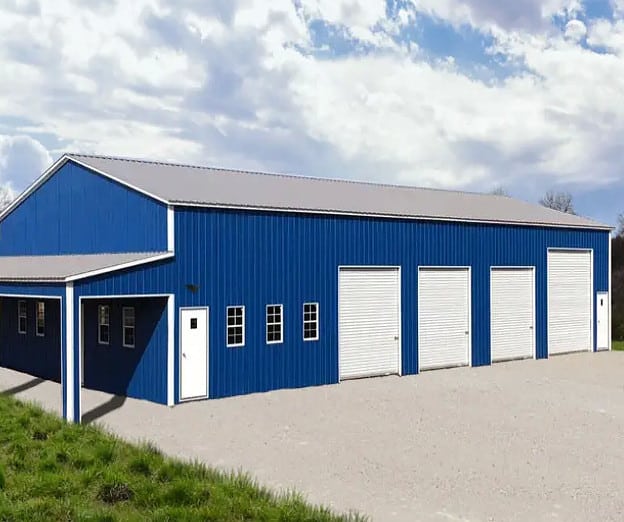
Likewise, when purchasing a metal carport for agricultural use, there are several other options that a buyer should consider in order to ensure that the carport is well-suited to their specific needs. Here are a few options to consider:
- Roof style: Metal carports are available in a variety of roof styles, including regular, boxed-eave, and vertical. Each style has its own advantages and disadvantages, so buyers should consider factors such as weather conditions and aesthetics when choosing a roof style.
- Color options: Metal carports are available in a wide range of colors, which can be an important consideration for buyers who want to match the carport to existing buildings or to create a cohesive aesthetic for their property.
- Anchoring options: As mentioned earlier, anchoring is important for ensuring the stability of a metal carport. Buyers should consider the different anchoring options that are available, such as concrete anchors or ground augers.
- Enclosures and doors: Depending on the intended use of the carport, buyers may want to add enclosures or doors to the structure. This can provide additional protection from the elements and help to secure equipment, supplies, or animals. Common enclosure options include side panels, end panels, and roll-up doors.
- Insulation: Depending on the climate and intended use of the carport, insulation may be necessary to regulate temperatures and provide a comfortable environment. Buyers should consider adding insulation to the carport, which can help to reduce energy costs and protect equipment and supplies.
- Electrical wiring and lighting: Depending on the intended use of the carport, buyers may need to add electrical wiring and lighting to the structure. This can be particularly important for agricultural processing or production activities, which may require specialized lighting or electrical equipment.
- Customization: Metal carports can often be customized to meet specific needs, such as adding extra height, width, or length. Buyers should inquire about the availability of customization options and the associated costs.
By considering these and other options, buyers can select a metal carport that is well-suited to their agricultural needs and provides a durable, functional, and attractive addition to their property. It is important to work with a reputable and knowledgeable supplier or contractor who can provide guidance and advice on the selection and installation of a metal carport for agricultural use.
